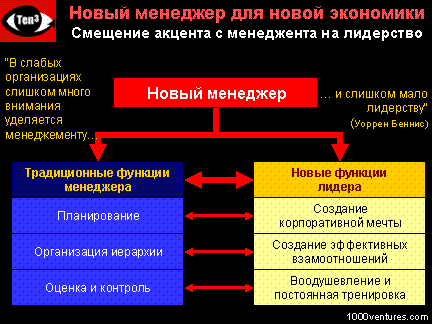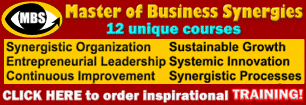|
New Management Model for the New Knowledge Economy of Rampant Change and Rapid Globalization |
|
by Vadim Kotelnikov, Founder, The first-ever BUSINESS e-COACH for Innovative Leaders, 1000ventures.com
"Good management cannot compensate for a lack of vitality" - Jean-Renķ Fourtou, Chairman of Rh¶ne-Poulenc
|
Organizational and Management Evolution: Three Stages7
|
|
New Management Model versus Traditional One1
|
Traditional Model
|
New Model
|
Managing Assets
|
Managing Resources and Capabilities
|
Built around assets
|
Built around capabilities
|
Focus on managing numbers
|
Focus on creating value
|
Hierarchical
|
Networked
|
Independent parts
|
Interdependent parts
|
Reactive
|
Responsive
|
Command and control
|
|
Rationality and analysis
|
Intuition and analysis
|
Risk-averse blame culture
|
Encouraging radical ideas and risk-taking
|
Why New Management Model? The old traditional ways of managing not longer work and will never work again. The old management practice has been erected on the assumption of human limitations as a basis for organizing. "This assumption is so pervasive that it can be found in almost every aspect of conventional managing, from the way we over-bureaucratize our organizations and control the workforce to the way we develop and impose strategies on others without their participation or consideration of their potential contribution."3 In the new knowledge-driven economy, people have become your firm's most precious and underutilized resource. They are your firm's repository of knowledge and they are central to your company's competitive advantage. Well coached, and highly motivated people are critical to the development and execution of strategies, especially in today's faster-paced, more perplexing world, where top management alone can no longer assure your firm's competitiveness. At all levels, your company needs people who can deliver at the frontier of performance. They must understand where your company is going and be able to influence this path. They must share in your company's fortunes and be motivated to push for greater achievements. Leadership - the New Managerial Task In the new era of rapid changes and knowledge-based enterprises, managerial work becomes increasingly a leadership task. Leadership is the primary force behind successful change. Leaders empower employees to act on the vision. They execute through inspiration and develop implementation capacity networks through a complex web of aligned relationship...More New Focus: Managing Business Enablers Modern managers focus their attention on three key business enablers: people, knowledge, and coherence. The ability of corporate management to influence the financial performance is greatly enhanced through these three enablers. "This shift of focus goes well beyond the standard debate of long-term versus short-term focus of management. Management must make sure that all three of these enablers are in place and are working well... If they are, both short-term and long term performance are enhanced tremendously."1...More New Ways of Working with People We are living in a changing, faster-paced, more perplexing world - one in which educational backgrounds, needs, desires and attitudes to work have changed. Changing the ways that you work with people of your workplace and establishing a new people partnership environment will take time, patience and commitment to make the shift that is needed in this key element of your new management model. But making that shift is worth the trouble that's involved. "For once it is made you'll be able for it will enable you to drop the old ways of people management - based on threats, manipulation and domination - and pick up the twenty-first century ways - based on sharing, co-operation and consensus."5 Motivating Manager As a new manager, you have great influence on employee motivation. With the right set of techniques, like the one included in The Ten3 Business e-Coach, you can affect your employees' behaviors right now. "You can reawaken and revive the spirit in your organization. Not only that, you can inspire all those around you by creating an environment in which employees will tap their own motivational energy and perform their best work."11 NLP and the Modern Manager Neuro-Linguistic Programming (NLP) is the psychology of excellence and the technology of achievement and success. In new era of rapid change, systemic innovation, knowledge enterprises, employee empowerment and creative teamwork, an increasing number of executives shift emphasis from classic control-based managerial practices to managing the web of relationships in their organizations. They realize that it is their expertise in building and maintaining harmonic relationships between workers and managers, between employees and customers that makes the difference and helps their companies to achieve sustainable growth. If you wish to be a new manager, you must understand that your art of working with other people is the most important one you should master, and your capability of influencing others and motivating them to achieve corporate goals is the most important manager's talent. Though this art is practiced by a few by intuition, it can be learned and mastered by many with the help of NLP techniques...More Leading Knowledge Workers Knowledge workers thrive on leadership, but they have an increasingly low tolerance for being managed. New managers should balance motivational leadership, coaching, and sound business management to keep all these independent thinkers pointed in the same direction and working towards the same goal. "The challenge facing leaders has never been more formidable: How do you create cohesion among a global community of educated people who are increasingly mobile and likely to be experts in their own right?"4...More Working Within the Ambiguity In the rapidly changing business environment, new leaders distinguish themselves from traditional managers "by their ability to work within the ambiguity without rushing to remove it. It is from this ambiguity that opportunity emerges."4 Case in Point: 25 Lessons from Jack Welch Jack Welch's goal was to make General Electric (GE) "the world's most competitive enterprise." He knew that it would take nothing less than a "revolution" to transform that dream into a reality. "The model of business in corporate America in 1980 had not changed in decades. Workers worked, managers managed, and everyone new their place. Forms and approvals and bureaucracy ruled the day."9 Welch's self-proclaimed revolution meant waging war on GE's old ways of doing things and reinventing the company from top to bottom. To get GE to successfully compete in an increasingly complex and competitive business environment, he altered significantly the way managers did their jobs. Actually, he wanted to discard the term "manager" altogether because it had come to mean someone who "controls rather than facilitates, complicates rather than simplifies, acts more like a governor than an accelerator." The current business environment requires an energized, energizing leader: "You've got to be live action all day. And you've got to be able to energize others. Your cannot be this thoughtful, in-the-corner-office guru. You cannot be a moderate, balanced, thoughtful, careful articulator of policy. You've got to be on the lunatic fringe."10 The revolutionary massive changes introduced by Jack Welch worked - "whether it was the change that made GE businesses leaders in their market, or that added profitable, productive businesses to GE's family, or that tapped the brains of knowledgeable employees."8 By the mid-1990s GE had become the strongest company in the United States and the most valuable company in the world, as measured in market capitalization. Today, GE with its unique learning culture and boundaryless organization is one the most admired company in the world. The techniques and ideas that Welch has employed to move GE forward are applicable to any size corporations, small, medium, or large."8...More
|
||||||||||
Bibliography:
-
"The Centerless Corporation", Bruce A.Pasternack and Albert. J. Viscio, 1998
-
"Building Tomorrow's Company", Philip Sadler, 2002
-
"MegaChange", William F. Joyce, 1999
-
"Relentless Growth", Christopher Meyer, 1998
-
"Performance Management", Phil Baguley, 2001
-
"Leading on the Edge off Chaos", Emmet C. Murphy and Mark A. Murphy, 2003
-
"MegaChange", William E. Joyce, 1999
-
"Jack Welch and the GE Way", Robert Slater, 1999
-
"The Welch Way", Jeffrey A. Krames, 2002
-
Jack Welch quoted in Washington Post, March 23, 1997
-
"How To Motivate Every Employee", Anne Bruce, 2003





